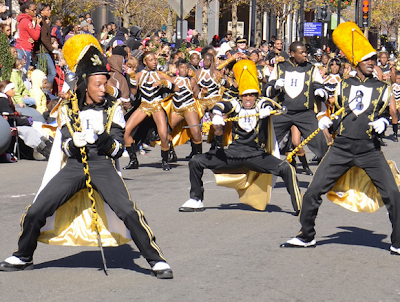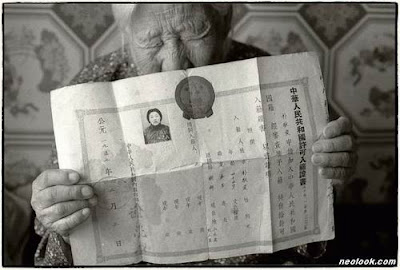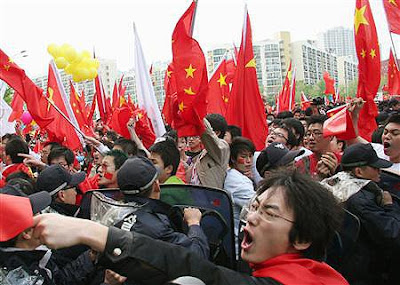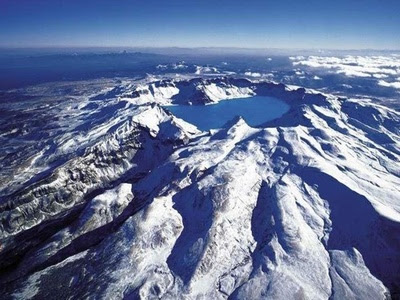UPDATE:
At the time I had also made the prediction that an eruption of Paektusan (aka Baekdusan or Mt Baekdu) could spell the end of the Pyongyang regime.
Anyway, the sh¡t-your-pants scary post starts right after the giant postage stamp. [UPDATE 2: Thomas at Cha0s Central has a piece on how North Korea's nuke tests beneath the volcano are a bad idea.]
ORIGINAL POST:
The
Chosun Ilbo is
reporting that Mt Paektusan (also spelled as Baekdusan and known in China as Changbaishan), the iconic volcano that forms the apex of the North Korea-China border, is "99% likely to erupt by 2032":
Taniguchi based his inference on the historical relationship in timing between earthquakes in Japan and eruptions of Mt. Baekdu. Historical documents from Korea and China show that Mt. Baekdu erupted at least six times between the 14th and 20th centuries, Taniguchi said, and every time it followed an earthquake in Japan.
Actually, with or without the Japanese seismic connection, Paektusan is a tad overdue for a major eruption.
What I’m about to write (a condensed version of something I wrote a while ago for offline purposes) may scare the sh¡t out of you. Don’t ask me how I know. I just do.
Imagine a Korean Peninsula (including the south, hundreds of kilometers away), filled with endless days of acid rain. Leaching away life in so many forms and devastating the land. Plumes of fire bursting through the frozen land with a tremendous roar.
The water stored in the Lake of Heaven bursting out, sweeping across North Korea’s Hamgyŏng Province and beyond. Researchers at the National Institute of Environmental Research say that we should expect sediment to pile up from a few meters deep to hundreds of meters.
On the day of the eruption, volcanic ash could fill the skies over Seoul. The sun will be blotted out. Ash will fall from the sky like gray snowflakes. Since the ash blocks out the sunlight, it will be as if day had turned into night.
Up north, we should expect massive casualties and untold agricultural damage. Even in the south, people will suffer terrible respiratory problems. All kinds of things will be shut down — schools, airports, government services, corporate offices — as if Korea were undergoing its own vulcan 9/11.
Like Japan with the tsunami, South Korea’s high-tech industry, like semiconductors, might face serious problems. If the eruption happens in the colder months, it could mean a devastatingly long winter. Acid rain, bitter cold, and a lack of sun may mean a year without spring. Food prices will skyrocket as domestic food production virtually shuts down.
The effects won’t be felt just in the Koreas or even their neighbors: globally, the volcanic ash and toxic gases traveling the planet for about a year could lead to a reduction in solar energy hitting the lower atmosphere, and the planet’s average temperature could drop by two degrees Celsius.
This may seem like a worst-case scenario, but it’s based on what happened in Korea a little more than a millennium ago, in 969 AD (or 990 AD).
From ancient times, early Koreans considered Mt Paektusan to be the setting of the legend of Tan’gun, the semimythical founder of the Korean people. Mt Paektusan has long been considered a spiritual place to Koreans, but its beauty and shape are the result of volcanic activity.
The entire entity is one huge volcano. The ring of peaks that surround the caldera indicate that lava flowed not in toward the Lake of Heaven but outward. There was likely a huge volcanic edifice, but it is no longer present. Geologists believe that about a third of the peaks along the rim were blown away when the volcano erupted in the tenth century AD. Geologists now believe that the summit may have been a thousand meters higher than it is now.
A large portion of the mountaintop was blasted away or caved in (similar to Mt St Helens in Washington State, whose tremendously large top blew away in an instant). At the last stage of Paektusan’s eruption, a large explosion obliterated the main peak, and the rest collapsed into the caldera.
The area is surrounded by black pumice, which results when basaltic magma was forcibly ejected. It’s frequently found in areas of past volcanic eruptions. The layer of pumice found around Paektusan is as much as seventy-five meters thick. It drops to ten meters elsewhere in Hamgyŏng Province, only ten centimeters in the East Sea, and five centimeters near the island of Hokkaidō in Japan.
Archaeologists and geologists doing excavations at Japanese historic sites end up finding clues to volcanic eruptions in Korea, like Mt Paektusan. That’s why they’re issuing reports like the one in the Chosun Ilbo. The pattern of ash found in places like Hokkaido indicate that such particulate matter filled the skies over Japan after an eruption.
Imagine the impact of something like that today. Iceland’s Eyjafjallajökull volcano had a violent eruption in April 2010 (picture above). The ash cloud and debris blocked air routes and brought $1.4 billion of economic damage to the far away European mainland.
Human costs are also high. The 2011 eruption of Murapi volcano on Indonesia’s island of Java went down in the record books as the largest in a century. It took the lives of 389 people and left a hundred thousand homeless.
Putting Mt Paektusan in perspective, we should consider the
Volcanic Explosivity Index (VEI), which rates eruptions on a scale of one to eight, depending on eruptive magnitude.
Fragmental material from the Murapi and Eyjafjallajökull eruptions, called tephra, could fill a volume of one-tenth of a cubic kilometer. That puts these eruptions at magnitude 4. But the eruption of Mt Paektusan a thousand years ago ejected from 115 to 150 cubic kilometers of tephra, giving it a VEI magnitude of 7 (
one of only three since the time of Christ).
Paektusan’s eruption a millennium ago, which is rated as “super-colossal,” was one thousand to fifteen hundred times more severe than the Indonesian or Iceland eruptions. in fact, the eruption of Mt Paektusan may rank as the second most powerful eruption in the past two millennia of human history (more on that here).
I believe it was five to seven times greater than Krakatoa, perhaps the most famous historical eruption to 21st century humanity, yet most people around the world have never heard of the threat. Some in South Korea are taking it seriously, though (see
here,
here,
here, and
here).
Mt Paektusan is not on the edge of a tectonic plate but within it. There’s a theory suggesting that the plate under Japan wasn’t sliding downward but was stuck 700 meters beneath and was blocking energy from being released. In other words, the heat under the mantle was trapped for a great deal of time and had to find an exit to break through. The theory holds that that vent was Mt Paektusan.
A hotspot such as Mt Paektusan is what results. This is believed to be a place where a plume of mantle hotter than regular mantle rises to the surface. Volcanoes located within the interior of a tectonic plate are often called hotspot volcanoes. (The entire Hawaiian Island archipelago is formed in this way, with the hotspot remaining stationary but the plate moving along, allowing a new island to form when the hotspot is under a new part of the plate.) Hotspot volcanoes often wield more eruptive power than other volcanoes, since the condensed energy in their magma chambers erupts at once.
In 1998, a Chinese geological research center announced that there are four magma chambers beneath Mt Paektusan. These four magma chambers have supplied the mountain with energy for thousands of years.
Now where it all gets funky is that the historical record indicates a fairly regular pattern of explosive activity. According to
The Annals of Koryŏ History (
Koryŏsa), in 946 AD, the first year of
King Chŏngjong, there are lines making reference to an eruption of Mt Paektusan.
“In this year, a drumbeat from the sky ordered the Bill of Amnesty.”
— 946 AD, the first year of the reign of King Chŏngjong of Koryŏ, recorded in Koryŏsa (The Annals of Koryŏ History)
A contemporary Japanese history, The Chronicles of Kōfuku-ji Temple, also indicated an eruption from Mt Paektusan eruption in the same year:
“One night, white volcanic ash fell down from the sky like snow.”
— 946 AD, the ninth year of the reign of Emperor Suzaku of Japan, recorded in The Chronicles of Kōfuku-ji Temple.
Later, during Korea’s 600-year Chosŏn era, references to volcanic eruptions were frequently recorded:
“Ash fell down like rain in the northeastern region.”
— 1403 AD, the third year of the reign of King T’aejong of Choson, recorded in T'aejong Shillok (The Annals of King T'aejong)
Time-wise, they were somewhat regular:
“The sound of gunfire could be heard from up high.”
— 1597 AD, the thirtieth year of the reign of King Sŏnjo of Chosŏn, recorded in Sŏnjo Shillok (The Annals of King Sŏnjo)
“Volcanic ash fell like rain in the Myŏngchŏn region of Hamgyŏng Province.”
— 1673 AD, the fourteenth year of the reign of King Hyŏnjong of Chosŏn, recorded in Hyŏnjong Shillok (The Annals of King Hyŏnjong)
Based on such historical records, scientists speculate that Mt Paektusan repeatedly erupted at an interval of approximately once every century or so.
Indeed, after the super-colossal eruption a little over a millennium ago, Mt Paektusan underwent several smaller eruptions about once every century. Historical records indicate that the last eruption took place in 1903, so we’re about overdue since the last eruption.
The really worrisome thing, though, is that based on the thousand-year cycle of a major eruption, those two periodic factors point to the possibility of a major eruption on Mt Paektusan in the near future, which is bolstered by the Japanese prediction of 99% likelihood by 2032.
North Korea is not exactly in a cooperative mood, however, when it comes to geological surveys meant to gauge the actual threat, even though Mt Paektusan’s geological features point to the high possibility that we could see a repeat of past disaster, but now with more people in the path of destruction.
This is some scary sh¡t we need to pay attention to. If a volcanic eruption causes the Lake of Heaven to break apart, two billion tons of water filled with pyroclastic material and other debris would gush forward. That would bring a destructive mudflow called a lahar.
Ground zero for the cataclysm would be the Lake of Heaven. Specialists predict that the two billion tons of water that fill the deep caldera would instantly gush out and flow down the sides of the mountain.
Another major problem is the layers of volcanic deposits surrounding Mt Paektusan. They are so fragile that the slightest force could cause collapse. If water from the Lake of Heaven were to sweep away these deposits, it would cause an unprecedented lahar, an avalanche of rocks and soil.
The slopes of Mt Paektusan are typically at a forty- or fifty degree angle. Scientists have calculated that water could rush down the mountainside at a hundred kilometers per hour. Villages, buildings, and farmland would all be instantly destroyed, much like what we saw in the tsunami that engulfed six prefectures along the northeastern coast of Japan.
This is not some insensitive exaggeration. It’s meant to provide perspective.
How bad things get would depend on which way the wind blows. If the winds are from the north, volcanic ash would cover the entire Korean Peninsula. Several millimeters or even centimeters would coat everything, including houses, buildings, and roads. Think annual “yellow dust” from China, on steroids, for days and days on end.
On the other hand, if the ash were to soar through the atmosphere and stay in the stratosphere, serious problems could result for the rest of the planet. The average temperature around the globe could drop by as much as two degrees Celsius within a year, which could bring about worldwide problems as food supplies decrease, fish and bird migrations are disrupted, and plant growth and agricultural production suffer. Health-wise, we’d see dramatic fluxes in bacteria and viruses.
This is not unprecedented. Laki, a volcanic system in Iceland, erupted in 1783, triggering a long cold spell throughout Europe. Because of the resulting widespread famine, commoners rose up in rebellion against royalty, leading to the French Revolution in 1789.
Indonesia’s Tambora volcano erupted in 1815. Annual average temperatures dropped by four degrees Celsius, making it the so-called “year without summer.”
Just how would Mt Paektusan’s eruption “rock the world”? Perhaps the resulting chaos would mean an end to the Pyongyang regime, which would buckle under the catastrophe and resulting human crisis. Unable to provide basic functions, much less evacuate, feed and house people in the path of destruction, the regime would simply collapse as international organizations push their way in (perhaps led by the Chinese, who be dealing with calamity on their side of the mountain).
Trying to predict when this will happen is the top priority right now. Fortunately, there are some clues. Seventy percent of the water in the Lake of Heaven is from precipitation, while the remaining thirty percent comes from underground. The portion from underground is affected by magmatic activity and would contain magmatic substances that leave isotopic traces. Some geologists argue that if magmatic activities have intensified, the isotopic ratio of hydrogen and oxygen found in the Lake of Heaven would differ from that of normal surface water.
In fact, some believe there may have been an actual decrease in frequency of seismic and volcanic activity around Mt Paektusan over the past few years.
Chinese researchers report that seismic activity in the area peaks about every ten years. Based on this, some have theorized that there could be an eruption in North Korea in 2014 or 2015. The press openly speculated that Mt Paektusan might erupt, which has led to considerable controversy. What is certain is that Paektusan is an active volcano that could erupt at any time.
It almost seems as if volcanoes erupt just as people begin to start ignoring them. How should we welcome a newly rousing Mt Paektusan? What would South Koreans do to help the North? Would the government fall? Would Japan and China also be adversely affected? Is there something we can actually do (e.g., tap into the magma chambers by drilling into them and somehow “lance the boil”)?
Interesting questions all.
...
Sphere: Related Content













































